Suchergebnisse für "Factsheet: Energietechnologien gestalten, die für alle sinnvoll und nutzbar sind"
Urbaner Kältebedarf in Österreich 2030/2050
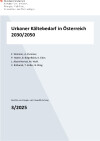
Systematische Aufarbeitung des steigenden Kühlbedarfs und Darstellung der geographischen Verortung des Kältebedarfs in Österreich. Das Ergebnis dient als Entscheidungshilfe bei der Entwicklung von Klimaschutzmaßnahmen und Klimawandelanpassungsstrategien sowie eine Abschätzung zum Kältebedarf der Zukunft.
Schriftenreihe
3/2025
F. Wimmer, A. Pummer, P. Holzer, B. Beigelböck, K. Eder, L. Abart-Heriszt, M. Wolf, C. Rzihacek, T. Keller, B. Kling
Herausgeber: BMK
Deutsch, 91 Seiten
Downloads zur Publikation
Designing Synergies. Spatial and Energetic Transformation Scenarios for Small Towns and Municipalities Using the Example of the Wagram Region (Lower Austria).
An interdisciplinary exploratory project that synergistically analyses strategies for the activation of vacant buildings and the potential for the formation of small-scale energy communities. The starting point is student projects from the Institute of Architecture and Design, TU Wien, for four municipalities in the Wagram region. On this basis, an interdisciplinary team of experts is developing a concept for a synergy cluster focussing on spatial energy planning, building physics, the circular economy and social innovation.
Umsetzung regionaler Elektromobilitätsversorgung durch hybride Kopplung (Move2Grid)
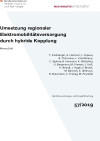
Aufbauend auf den Ergebnissen der „Stadt der Zukunft“ Sondierungsprojekte „Smart Exergy Leoben“, und „Energieschwamm Bruck“ soll im gegenständlichen,umsetzungsorientierten Forschungsvorhaben anhand des Beispiels Leoben untersucht werden, wie mit regionalen, erneuerbaren Ressourcen regionale Elektromobilität langfristig versorgt, optimal ins kommunale Verteilernetzsystem integriert und ökonomisch nachhaltig implementiert werden kann.
Schriftenreihe
57/2019
T. Kienberger, A. Hammer, J. Vopava, B. Thormann, L. Kriechbaum, C. Sejkora, R. Hermann, K. Watschka, U. Bergmann, M. Frewein, J. Koß, H. Brandl, J. Vogel, S. Moser, M. Baresch, K. de Bruyn, R. Braunstein, C. Freitag, M. Peyreder
Herausgeber: BMVIT
Deutsch, 172 Seiten
Downloads zur Publikation
Langzeitevaluierung des Energieverbrauchs von 100 energieeffizienten Gebäuden in Österreich als repräsentativer Querschnitt österreichischer Leuchtturmobjekte (LZE 100 Leuchtturmobjekte)
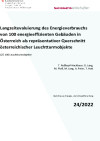
Erfassung, Auswertung und Analyse von Energieverbrauchsdaten von 100 energieeffizienten Gebäuden in Österreich über eine Betriebszeit von 3 bis 25 Jahren als repräsentativer Querschnitt der österreichischen Leuchtturmobjekte. Differenzierung nach Gebäudetypen, Energieträger und Ermittlung der realen Treibhausgas-Emissionen. Vergleich der gemessenen Verbräuche zu Benchmark-Werten.
Schriftenreihe
24/2022
T. Roßkopf-Nachbaur, G. Lang, M. Ploß, M. Lang, A. Peter, T. Hatt
Herausgeber: BMK
Deutsch, 143 Seiten
Downloads zur Publikation
Der städtische Untergrund als Rohstoffmine? Potential an Sekundärressourcen in der erdverlegten Infrastruktur
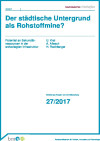
Machbarkeit eines Ressourcenkatasters zur Inventarisierung, Charakterisierung und Verortung der Materialbestände in den erdverlegten Infrastrukturnetzwerken österreichischer Stadtregionen. Das Ergebnis dient der ökonomischen Bewertung von Sekundärrohstoffpotenzialen.
Schriftenreihe
27/2017
U. Kral, A. Allesch, H. Rechberger
Deutsch, 73 Seiten
Downloads zur Publikation
Co-Housing Gutenberg: Integrated Sector Coupling for Shared Living, Energy, and Mobility
The "CoHoGutenberg" project aims to establish a sustainable co-housing model in the rural community of Gutenberg, Styria, by combining sufficiency principles with state-of-the-art energy technologies.
Integration von Begrünung in den österreichischen Energieausweis (GREENergieausweis)
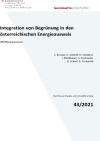
Anpassung der Berechnungsmodelle im Energieausweis derart, dass Gebäudebegrünung darin möglichst realistisch abgebildet werden kann und Abschätzung zur Akzeptanz einer Umsetzung bei relevanten Stakeholdern.
Schriftenreihe
43/2021
C. Kresser, E. Schriefl, H. Schöberl, I. Mühlbauer, S. Formanek, B. Scharf, G. Frühwirth
Herausgeber: BMK
Deutsch, 71 Seiten
Downloads zur Publikation
sustAIn4Build - AI competence for sustainable building management in climate neutral cities
The objective of the project sustAIn4Build is to increase energy efficiency and sustainability in the building sector by using artificial intelligence (AI). Industry-specific training programs support Austrian companies to develop a workflow for integrating AI technologies into their processes, enabling them to develop resource-saving, cost-effective and sustainable solutions. This strengthens their competitiveness and contributes to the achievement of European decarbonisation goals.
Urban Sky - Satellite-based planning and analysis applications for climate-neutral and resilient cities
The project investigates how satellite data can support cities and municipalities (e.g. urban development, spatial energy planning, mobility transition). Based on demand and potential analyses, service concepts will be derived that integrate existing data and tools with satellite applications. The results will be presented in a study and a Space4Cities implementation roadmap.
GeoDatKlim - Geo Data and Satellite Data for Carbon Neutral Cities
The Vienna Geospace Hub innovation lab will help optimize the application of geospatial and satellite data to solve complex urban challenges. The innovation lab serves as a networking platform for administration, science, economy, as well as a development and test environment for innovative use cases.
IntEGrity - Integration and Diffusion of Energy Communities
IntEGrity aims at fully integrating energy communities in the existing energy landscape in order to push for efficient diffusion and to use the potential of the positive contribution to energy awareness, efficiency and climate neutrality. In order to fully enable integration, the project explores innovative developments on three levels - social level, energy community level and service level.
BIMstocks - Digital Urban Mining Platform: Assessing the material composition of building stocks through coupling of BIM to GIS
The main goal of BIMstocks is the development of a method for the digital capturing of the material composition of the existing building stock for follow up modelling of an Urban Mining Platform as well as for the prediction of the recycling potentials.
RENOWAVE.AT - The innovation lab for sustainable, climate-neutral renovation of buildings and districts
RENOWAVE.AT will act as a central contact point for collaboration in innovation projects and provide systematic and early access to as well as promote innovative, scalable renovation concepts and sustainable renovation technologies within real development environments (open innovation principle).
3D*3B - 3D-Concret Printing, Reinforcement for low carbon and bending stressed structures.
The project is about 3D printed structural elements and their integration in building structures. The focus is predominantly set on bending stresses structural elements like panels and slabs. Results will point out technical, logistic and climate relevant aspects.
M-DAB - Digitise, analyse and sustainably manage the city's material resources
The research project investigates how digital technologies can support us in determining the existing and future material resources in construction qualitatively (building materials and their recycling) and quantitatively (quantities of building materials).
BIMpeco - Environmentally relevant product data in collaborative BIM environments
Construction products can pose a risk to the environment and health due to their pollutant content or releases. In the BIMpeco project, workflows and data structures for digital information management of this environmentally relevant product data are developed. For this purpose, the new ISO standards ISO 23387 and ISO 19650-1 are tested and synchronized with established process flows. The project results will be made available on an open-source basis and can be integrated into any Common Data Environment (CDE) that complies with the standards mentioned. The BIMpeco project is the first to lay the foundations for product information management of environmentally relevant properties in the CDE, covering the entire lifecycle and supply chain.
Urban district heating extended – Development of flexible and decarbonized urban district heating systems
Development of innovative urban district heating systems by integration of long-term thermal storage, large scale heat pumps, large scale solar thermal installations, waste heat recovery and analysis and evaluation by simulation. The results of this project will provide templates for technology selection, system design and merit order for new urban district heating areas.
BIM2BEM Flow - Continuous BIM-based energy efficient planning
Automated integration and assignment of exchange requirements between the design and simulation programs, based on the elaborated exchange information requirements, should enable continuous energy efficiency planning along the design phase.
NaNu3 - Parametric Planning for a Sustainable Roof (Blue, Grey and Green)
Demonstration of the feasibility and validation of a parametric model that can evaluate the practical and financial feasibility of the combined use of roof areas as well as its microclimate and environmental effectiveness at an early planning stage.
Green BIM - Green building infrastructure as part of BIM-based planning and maintenance
Fusion of greenery and BIM planning to achieve a friction-free conducting and maintenance. By analysing the case studies, “Green BIM” examined to what extent typical steps in planning regarding greened buildings can be edited by characteristic software programs in a BIM-equitable way. The expected outcomes are supplements to international standards for data structures in civil engineering (IFC / ISO 16739) which are further on added to BIM applications by the software industry.
